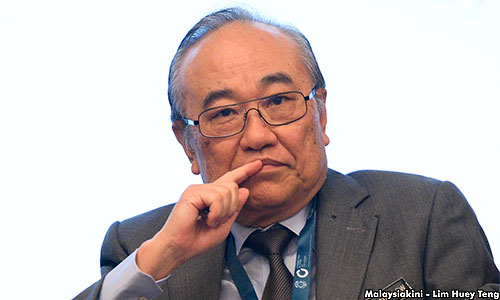“Religion is regarded by the common people as true, by the wise as false, and by rulers as useful.”
- Seneca
Really dumb ideas have no problem escaping from the Prime Minister’s Department, but Paul Low’s suggestion that the Christian community must be politically relevant and “be able to influence policy in a way that reflects the righteousness of God almighty", is probably the dumbest idea I have ever heard. It is right up there with how Hindraf used religion - Hinduism - as a means to highlight the disenfranchisement of the Indian community and of course, how Islam has been weaponised in Malaysia.
What exactly does “righteousness of the almighty” mean? Furthermore, how do religious groups influence policy if not by getting into bed with craven politicians by means of campaign donations and the rest of the sordid transactions between church and state? You want to know why Hinduism is regressive in this country? The answer is simple, because the MIC got into the business of religion.
So let me get this right. Paul Low - who works for a Muslim regime - thinks that the Christian community should not engage in politics but still find a way of influencing policy. This is probably the most disingenuous double-speak emanating from a Putrajaya minion I have ever heard.
Add to this Kuala Lumpur Archbishop Julian Leow’s disingenuous contention that “politics and political parties must be distinguished”. Really? In one of my numerous pieces about the so-called ‘Allah’ controversy, I referred to the reality that oppositional politics and religion were intimately entwined. I wrote:
“Meanwhile the DAP, which has more or less locked down the Chinese vote, continues to coddle the Christian evangelical movement within its rank, which finds expression in the putrid sloganeering of youth movements like 'Rise up it's time to take Subang for Jesus' endorsed by certain religiously-inclined DAP leaders.”
What this does is give pro-Umno propagandists the opportunity to further the narratives that Islam is under threat and that opposition parties are attempting to destabilise the country by religious means. Using religion as a political power tool always results in self-inflicted wounds.
Nowhere is this more evident in the unholy alliance between the supposedly secular DAP and vehemently religious PAS. Meanwhile, PKR was standing in the sidelines waiting for the whole thing to blow up, so that it could reconcile with PAS.
This is not to say that I think religious people should not make their voices heard in a milieu where there is no separation between mosque and state. When writing about the reality of religion in politics, I made two points:
1) “When the political, social and economic reality is predicated on religious superiority and oppression, religious people need to find ways to express themselves in democratic spaces and at the same time realise that the only security they have against further aggression is by supporting secular values.
2) “What I have been contemptuous of is the agenda of Christian politicians using religion as political capital and claiming to be secular while funding Islamic organisations to pander to the Malay/Muslim vote.”
Moreover, point two, the intersection between Christians and Muslims in the opposition, have done the most harm because the discourse was framed by craven politicians who were not interested in promoting secular values in both religions, but with creating and maintaining political power.
It is all about credibility. “Credibility is achieved by politicians who leave their religious affiliations at the door, and this is especially important for non-Muslim politicians when it comes to dealing with the Umno state...





